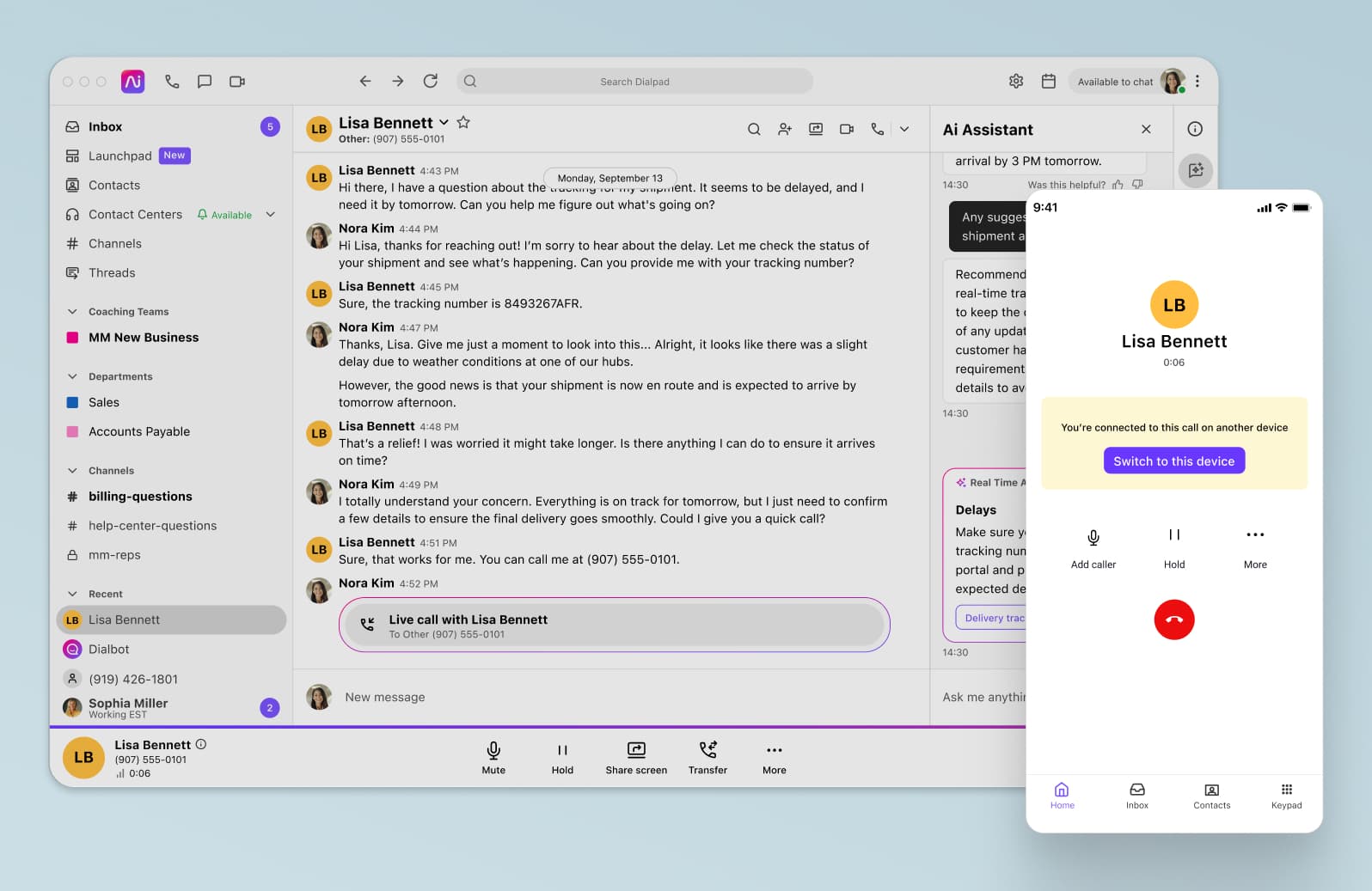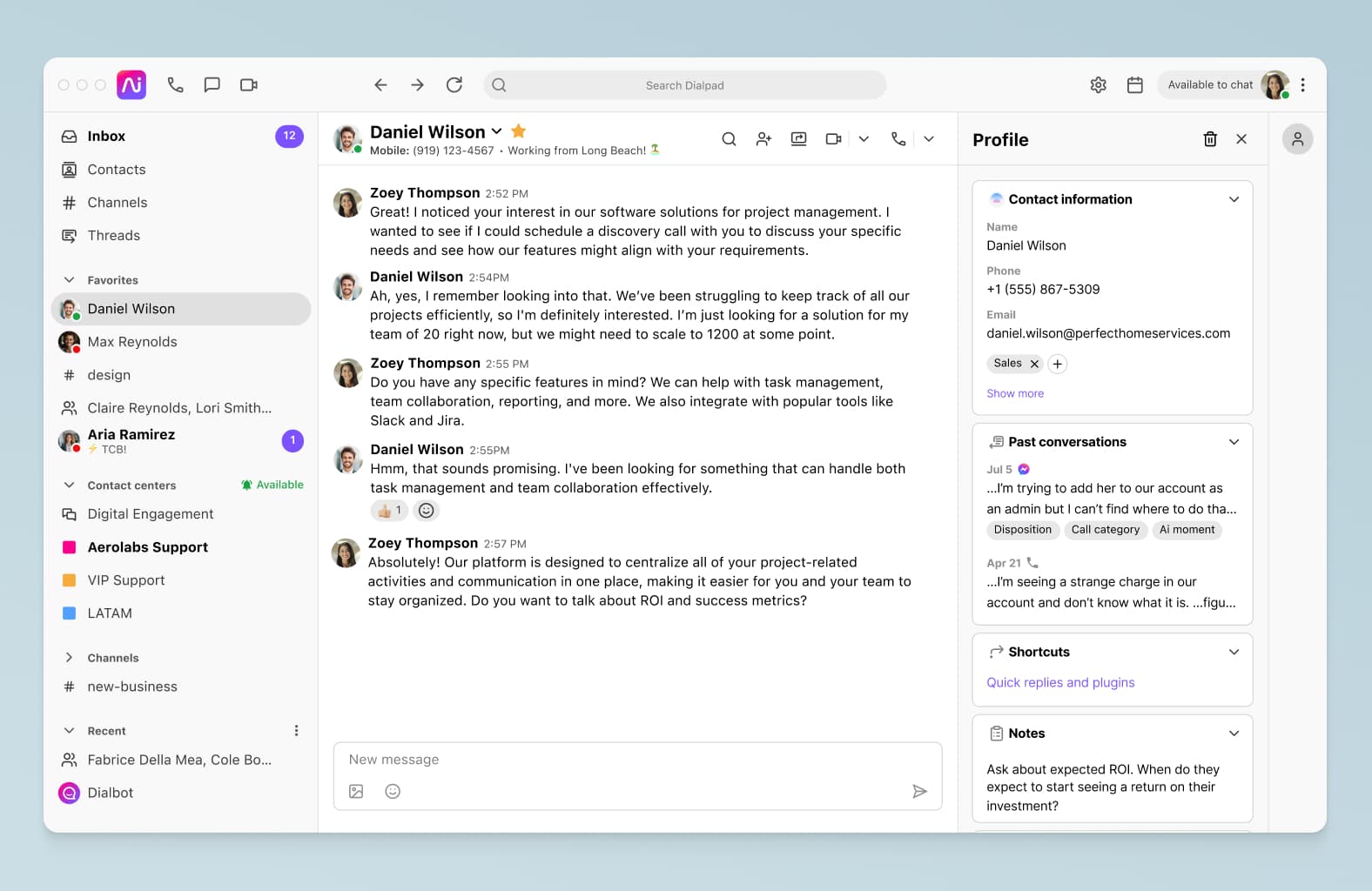How Wilson Logistics coordinates 400+ trucks with Dialpad Ai

Since 1984, Wilson Logistics has been providing fleets of trucks for companies of all sizes, with 400 trucks across the lower 48 states. That takes a lot of coordination (far more than a ham radio can provide).
They’re also making and receiving thousands of calls each day, between their recruiting team, road assistance, and fleet managers. There are calls to manage and communicate with drivers, to recruit new student drivers, and to work with contractors and vendors so they can get trucks fixed and back on the road quickly (should anything go wrong).
Well, the phone system they were using wasn’t quite up to the task. Wilson Logistics used an on-premises system from Mitel that consisted of seven different servers, and any time something went wrong, they’d have to reboot them all—in a specific order—before customer support would even talk to them.
On top of that, while Mitel did offer SMS business texting, they needed MMS text messaging to send photos and files as well. Adding that feature would have taken another three servers and a whole lot more money.
Dan Brewer, Vice President of Information Technology at Wilson Logistics, realized that they were paying too much and getting too little in return. He was hesitant to switch to cloud communications, until he looked at the numbers and saw a solution that would give him more features at a much better price. And that solution not only changed his mind, it also changed how Wilson Logistics works.
It’s really amazing how quickly Dialpad was adopted. We don’t even have desktop phones anymore—there’s no point.
Dan Brewer | VP of IT, Wilson Logistics
Going 100% softphone (with easy number porting)
The shift from on-premises phone systems to the cloud is not always an easy one, so when Wilson Logistics switched to Dialpad, they figured the transition would take some time. There are numbers to port, systems to move, and so many phones to deal with that surely it would have to take—wait, it’s done already?
“We were a little apprehensive about the transition, because we were moving everyone from on-premises hardphones to cloud-based softphones, but with the training and support it went really well,” Dan said. “Dialpad’s number porting was probably one of the easiest in my 38 years of doing this.”
In no time at all, all those servers could be tossed aside to clear up space, because Wilson Logistics went to the cloud, and didn’t need to bring their desk phones with them. Now everyone can use a desktop app, web browser, or mobile app for all their calls from the same business number:

“It’s really kind of amazing how quickly Dialpad was adopted. We don’t even have desktop phones anymore—there’s no point.”
Dan’s earlier concerns about cloud communications were laid to rest as Wilson Logistics used Dialpad. In fact, not only did it make him a believer, but he’s shared Dialpad with other IT professionals so they can see it for themselves. (According to Dan, they’ve shown demos of their Dialpad set-up at least three times.)
“I’ve been in this business for a long time, I’ve been in telephony, and I’ve been across a lot of different platforms. I’ve never been a fan of cloud phones. Never. And honestly, Dialpad really turned me.”

The Recruiting team’s favorite feature...
One of the biggest reasons Wilson Logistics had to move away from its old provider was the lack of MMS messaging. So what is it about Dialpad that made it such an appealing choice?
For starters, Dialpad provides SMS and MMS messaging from any device, as well as group chats within the app. That makes work significantly easier for everyone, but especially their recruiters:

The Recruiting Department uses texting to check drivers’ proof of licensing, physical tests, and other important documents. Before Dialpad, since they didn’t have MMS messaging, getting photos of those documents was, well, a real pain.
First, the driver would have to take a photo of everything and send it to the recruiter’s personal cell phone. Then the recruiter would have to use their phone to email the documents to their work computers, after which they’d download it and have the documents on file.
With Dialpad? The driver can message the photos directly to the recruiter’s Dialpad number, and they can access it directly on their computers. That’s literally all it takes.
“We’re averaging almost 3,000 texts a week,” Dan said. “The texts are starting to get close to what we make for actual calls. Drivers love text messaging.”
DIALPAD TIP
Dialpad’s messaging feature is great for sending text messages, group chats, and files, but only when you’re not driving!
Work from anywhere with cloud communications
How else has Dialpad helped Wilson Logistics? Well, another added bonus of no longer using an on-premises system is that it allows everyone to work from anywhere: in the office, at home, on the road, from a local park, at a nearby coffee shop—you get the picture.
“Dialpad has so many features and functions. It makes a huge difference, and now, since everybody is working hybrid, it allows our staff to work from home, and they’re not giving out their personal cell phone numbers.”
Plus, there’s always new features coming out to make work even easier. Since Dialpad is a hosted, cloud-based solution, there’s no need to install new updates or deal with any downtime as new features get installed. It’s just there and ready to go.
“It’s crazy how aggressive Dialpad is with rolling out new functionality,” Dan said. “As Dialpad keeps adding things, we keep evaluating how we roll them out and use them.”

Better, faster, and more reliable calls with voicemail drop and real-time analytics
What kinds of features has Dan (and everyone else at Wilson Logistics) been using? Voicemail drop is a big one—now whenever a sales rep reaches someone’s voicemail, they don’t need to recite a message every time. They can just press a button to “drop in” a pre-recorded message, then move on to the next call:
Not to mention there's Dialpad Ai, which uses artificial intelligence and natural language processing to help agents on every call. (Learn more about the use cases of AI in logistics and shipping.) With it, managers can see how calls are unfolding at any given moment, thanks to automatic, real-time transcriptions and sentiment analysis. And if the agent needs help, they can message them some advice on the side, or step in themselves:

“It’s great just being able to see the calls, follow the curve of conversations from negative to positive, and listen in. You can see the call, click on the transcript, and listen to it. That’s really nice.”
Perhaps best of all: Dialpad is reliable. Wilson Logistics used to have frequent crashes, and when they did, they’d need to reboot each server until they could solve whatever the issue was. These days, things are awfully quiet in the IT department. “Our ticket queue for phone troubles has gone away,” Dan said.
Creating custom integrations with an open API
One of the most interesting things that Wilson Logistics is doing with Dialpad is building a custom integration with Dialpad’s open API that integrates with the Algo SIP call boxes they use at the gates for their facilities.
FUN FACT
Dialpad’s open API allows developers to create custom workflows and integrations (in addition to its already expansive integrations library), which helps bring all your apps together to save time and manual data entry work.
What this custom integration does: Now, when a trucker arrives, they can ring the receptionist or fleet ops team, who can let the trucks in with the push of a button from their softphone—they don’t even need to be waiting in an office to do it.
This helps drivers save more time in between jobs and gives receptionists or fleet ops the ability to approve arrivals—even while they’re away from their desks. The API integration has also been especially helpful for drivers who may arrive at all hours of the day, because as Dan notes, “truckers don’t sleep.”
The days of dealing with constantly-crashing on-prem phone systems are over. Now that Wilson Logistics has switched to Dialpad, they have better calls, easier messaging, and so many new features that the only challenge is deciding what to try next. All the while, crashes are down and efficiency is up. “Dialpad really did advance us quite a bit further than the on-prem system we had.”
Ready to bring teams together in one workspace?
See Dialpad in action with a custom demo.











